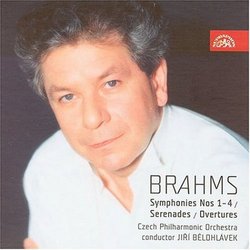| All Artists: Johannes Brahms, Jiri Belohlavek, Czech Philharmonic Orchestra Title: Brahms: Symphonies Nos. 1-4; Serenades; Overtures Members Wishing: 0 Total Copies: 0 Label: Supraphon Original Release Date: 1/1/2006 Re-Release Date: 6/27/2006 Album Type: Import Genre: Classical Styles: Chamber Music, Forms & Genres, Serenades & Divertimentos, Historical Periods, Classical (c.1770-1830), Symphonies Number of Discs: 4 SwapaCD Credits: 4 UPC: 099925386825 |
Search - Johannes Brahms, Jiri Belohlavek, Czech Philharmonic Orchestra :: Brahms: Symphonies Nos. 1-4; Serenades; Overtures
 | Johannes Brahms, Jiri Belohlavek, Czech Philharmonic Orchestra Brahms: Symphonies Nos. 1-4; Serenades; Overtures Genre: Classical |
Larger Image |
CD Details |
CD ReviewsThe Czech sound and Balohlavek's passion carry the day (don' Santa Fe Listener | Santa Fe, NM USA | 05/29/2009 (5 out of 5 stars) "Nostalgia does funny things. Years ago we complained about watery, wobbly French horns as played in Eastern Europe, reedy, whiny oboes, and less than perfect sheen in the string section. Those qualities have been turned into personal virtues by the Czech Phi., and now I appreciate them. It's a nice change not to hear the anonymous perfection of most international orchestras. That's the chief attraction in this Brahms cycle form Prague; it sounds hand made.
Jiri Balohlavek, whom I have heard with his new orchestra, the BBC Sym., can stay too close to the middle of the road, but in Brahms he's spirited to the point of boisterousness. Add that to the orchestra's special sound (which old-timers assure us was once even more distinctive), and you get memorable music-making. I was especially engrossed in the Second Sym., where the conductor skirts the easy pastoral approach and keeps the tension up throughout. Balohlavek's conception of the First is pulsing and powerful (too bad the all-important timpani are buried in the opening bars), yet there's an easy, songful musicality that saves the music from portentousness. There are apses into conventionality here and there, but the important thing is that the conductor tells a story from his personal viewpoint -- a rare thing today. the second movement in particular "speaks" as it unfolds. The Third opens vigorously, with lovely woodwind-brass balance and strings that move nimbly -- very nice. The chuckling clarinet solos in the second movement are charming, and the conductor offers enough variety to keep our interest, not easy in the middle of this symphony. Only the finale feels a little foursquare and underpowered. Balohlavek takes the first movement of the Fourth rather briskly, with lyrical rather than disturbing intent. He's actually lighter in the slow movement than he was in the Second's slow movement, something I've never heard before. The Czech woodwind section gets top billing here from the engineers. the finale is taken in the same vein, without emphasis on the wrenching, tragic possibilities. I think the strong entry here is the Second Sym., but overall there's not a more sheerly enjoyable Brahms cycle out there, so far as I know. It's too bad that the packaging covers four discs, but the good news is that you get both of Brahms's delightful Serenades (Haitink's old set with the Concertgebouw does the same). Both are perfectly suited to the Czech Phil.'s rustic, ebullient sound, and Balohlavek swings through them with infectious dance rhythms. They are almost worth the price of admission." |
